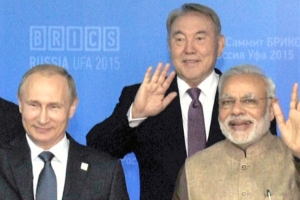Kyrgyzstan denounces cooperation agreement with U.S.
By Arslan Sabyrbekov (19/08/2015 issue of the CACI Analyst)
On July 21, Kyrgyzstan’s Prime Minister Tamar Sariev signed a government decree, unilaterally terminating the 1993 cooperation framework agreement with the U.S. Bishkek’s decision came as a reaction to the State Department’s decision to reward Azimjan Askarov with the Human Rights Defender Award. To Kyrgyz officials, Askarov is an ethnic Uzbek political activist serving a life sentence for organizing and taking part in the mass riots in Southern Kyrgyzstan in June 2010. In its official protest note to Washington, Kyrgyzstan’s Ministry of Foreign Affairs has referred to him as “a symbol of disruption” and described the award as evidence of an attempt to undermine the country’s unity.
Was the SCO summit in Ufa a breakthrough?
By Stephen Blank (19/08/2015 issue of the CACI Analyst)
The annual summit of the Shanghai Cooperation Organization took place on July 9-10 in Ufa, and ratified the expansion of membership to include India and Pakistan, and Iran may join in the future. Thus the SCO is well on the way to becoming a venue for the most powerful Inner Asian states to work together and discuss policy issues affecting Central Asia and beyond. But new membership is not likely to make this organization any more effective as a regional security provider. In fact, all the disputes among the major members, including India and Pakistan, might be imported into the SCO’s structure and serve as a brake on the expansion of its capabilities.

China pushes Pakistan to fight terrorism selectively
By Sudha Ramachandran (05/08/2015 issue of the CACI Analyst)
While China prods the Pakistani government to crack down on Uighur militants and their bases in North Waziristan, it ignores and even appeases Islamabad’s support of anti-India terrorist groups and has rushed to Pakistan’s defense in international forums. While this may endear Beijing to the Pakistani establishment, a selective approach to terrorism is not productive in the long run as groups like the East Turkistan Islamic Movement are drawing strength from Pakistan’s Inter-Services Intelligence’s terrorism network.

Iran and the SCO: new opportunities, new challenges
By Richard Weitz (05/08/2015 issue of the CACI Analyst)
Now that the UN Security Council has blessed the Iranian nuclear deal, Tehran’s chances of becoming a full member of the Shanghai Cooperation Organization (SCO) in coming years have improved, following a decade of rejection. Iranian leaders have long wanted to join the SCO to gain diplomatic, economic, and security advantages. Nonetheless, Iran will need to overcome several major obstacles on its path to full membership, even if nothing goes amiss with the implementation of its nuclear deal.
Uzbekistan concerned over SCO expansion
By Farkhod Tolipov (05/08/2015 issue of the CACI Analyst)
The Shanghai Cooperation Organization (SCO) held its annual summit on June 9-10, 2015, in the Russian town of Ufa, which was an historical turning point in the organization’s evolution. It adopted a Development Strategy towards 2025 and admitted India and Pakistan as full members. Uzbekistan has taken over the Chairmanship of the SCO from Russia for the next one year period. During the summit, Uzbekistan’s President Islam Karimov expressed concerns revealing Tashkent’s reluctant acknowledgement of the fact that from now on the SCO will be more than just a Central Asia-focused structure.







